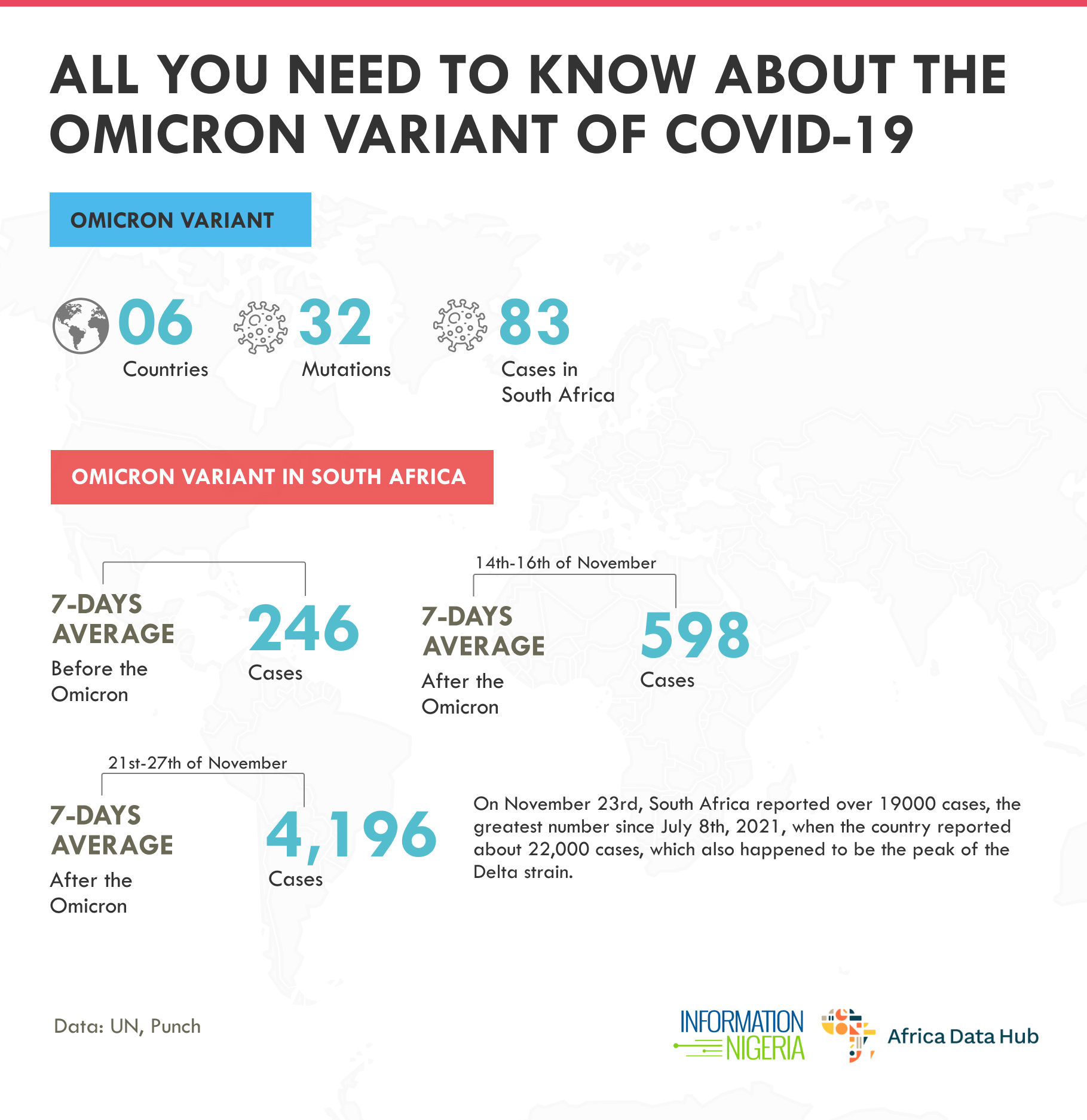
While the world at large was celebrating the gradual return to normalcy after almost two years of lockdown and social distancing guidelines occasioned by the COVID-19 pandemic. South Africa, on a Thursday evening, announced a new variant of COVID-19, B.1.1.529 — with 22 positive cases of the strain detected in the country.
The World Health Organization (WHO) named the new variant “Omicron” and designated it as a “variant of concern” (VOC) after a meeting of the technical advisory group on SARS-CoV-2 virus evolution (TAG-VE), an independent group of experts that monitors and evaluates COVID-19 evolution on a regular basis.

New Source of Concern?
Ever since the discovery of the COVID-19 virus, other strains of the virus have been detected in different parts of the world. In many countries in 2021, the Delta strain became dominant. According to the Centers for Disease Control and Prevention, it accounted for more than 80% of newly diagnosed cases in the United States (CDC).
However, the new variant detected has been a source of worry for health experts. Presently, the Omicron form has been found in six countries, with 83 cases in South Africa, six in Botswana, two in Hong Kong, two in the UK, and one each in Israel and Belgium.
The Omicron’s spike protein — the portion that allows the virus to infiltrate host cells and trigger infection — includes 32 mutations, some of which are novel. These mutations are twice as many as the Delta variant, which is the most prevalent and infectious COVID-19 variant to date.
These modifications in the spike protein not only damage the virus’s capacity to infect cells and propagate, but also make it more difficult for immune cells to attack it, separating it from the original coronavirus that existing COVID vaccines were developed to target.
How fast is it spreading?
The country’s 7-day average was 246 before the new variant was discovered in South Africa among samples collected on the 14th-16th of November. However, during the week in which the new variation was discovered, the country’s 7-day average was 598 instances, while the country’s 7-day average had grown to 4,196 cases between the 21st and 27th of November. On November 23rd, South Africa reported over 19000 cases, the greatest number since July 8th, 2021, when the country reported about 22,000 cases, which also happened to be the peak of the Delta strain.
What Are The Methods For Detecting It?
Fortunately, existing SARS-CoV-2 PCR diagnostics can identify this version, which is straightforward to distinguish from the Delta form.
Many laboratories have reported that one of the three target genes is not found in one widely used PCR test (known as S gene dropout or S gene target failure), and that this test can thus be used as a marker for this variant pending sequencing confirmation.
Using this method, this variation was discovered at a faster pace than prior outbreaks.
Covid-19 Vaccines: How Effective Are They Against Omicron?
Since this variant was very recently discovered, there is limited information about how it functions in the actual world.
How are Countries Reacting?
Following the identification of the novel variant, governments have taken steps to prevent the strain from being recorded. Travelers who visited South Africa, Botswana, Namibia, Zimbabwe, Lesotho, Mozambique, Eswatini, or Nigeria in the previous 14 days are barred from entering Indonesia. Britain has stated that it would test everyone coming into the UK, isolate all Omicron contacts, ramp up boosting and bring back compulsory face masks in some public places.
The new variant is being tested on hundreds of passengers arriving in the Netherlands from South Africa. Foreigners will be barred from entering the United States from South Africa, Botswana, Zimbabwe, Namibia, Lesotho, Eswatini, Mozambique, and Malawi, according to US officials, matching previous EU steps. On Monday, they will take effect.
Flights from South Africa, Namibia, Zimbabwe, Botswana, Lesotho, Eswatini, Seychelles, Malawi, and Mozambique will be suspended for 14 days, Australia announced on Saturday. Non-Australians who visited those nations during the last two weeks are no longer permitted to enter Australia.
Travelers from much of southern Africa will be required to quarantine for 10 days and take a total of four tests starting on Saturday, according to Japan.
For visitors traveling from South Africa, Botswana, and Hong Kong, India has ordered more stringent screening and testing.
Israel, where the new variant has been confirmed, has decided to prohibit all foreigners from entering the country beginning Sunday at midnight. All foreign nationals who have been via South Africa, Namibia, Zimbabwe, Botswana, Lesotho, Eswatini, or Mozambique in the recent 14 days are barred from entering Canada.




nawa00, anoda one
Still ohh man